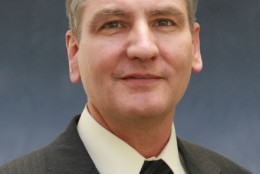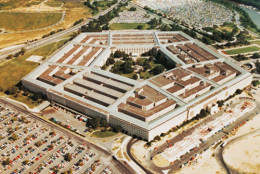Health IT
Verizon Enterprise Solutions’ Nancy Green, global healthcare practice lead, and Peter Pin, vice president of civilian and public sector markets, joined Federal News Radio Custom Media Director Jason Fornicola to address the main drivers in healthcare today and technology’s role in the future.
November 04, 2015-
The Department of Health and Human Services reports that more than 8 in 10 physicians have adopted an Electronic Health Record. Challenges remain and the industry is transforming with each new step. Dr. Keith Salzman is a health fellow and Chief Medical Information Officer with IBM’s Global Business Services. He joined In Depth with Francis Rose to discuss some of the latest innovations.
November 03, 2015 -
By the end of the week, DoD says it will certify to Congress that its health IT system is interoperable with the Department of Veterans Affairs. But the certification is a year later than Congress ordered, and VA has yet to issue its own certification.
October 28, 2015 -
Dave Bowen, the Defense Health Agency CIO, said getting the military services to sign off on a concept of operations for health IT shared services is a huge step toward meeting an Oct. 1 deadline to reach full operational capability.
August 10, 2015 Senior leaders from the departments of Defense and Veterans Affairs have been increasingly vocal in recent weeks about the work they have been doing over the past two years to achieve interoperability in the absence of a common electronic health record, vowing that they can meet Congress’ goal of health data interoperability without actually using the same software.
August 02, 2015-
The Pentagon capped off a more than two-year acquisition process for a new electronic health record Wednesday afternoon, awarding a $4.3 billion contract to a consortium of companies led by Leidos.
July 29, 2015 -
The Senate packed a lot into its version of the 2016 Defense authorization bill before final passage Thursday afternoon, and in a notable break from recent history, the full package passed well before the start of the new fiscal year.
June 22, 2015 -
What are the key priorities for National Institutes of Health Information Technology Acquisition and Assessment Center (NITAAC)? How does NITAAC assist federal agencies to accomplish their mission? Join host Michael Keegan as he explores these questions and so much more.
June 12, 2015 -
The Veterans Independence Act aims to restructure the Veterans Health Administration. The Act comes from the advocacy group Concerned Veterans of America, and it proposes a new business model for the agency that separates veteran health care plans from specific hospitals and facilities. Darin Selnick is executive director of the Fixing Veterans Health Care Taskforce, and senior veterans affairs adviser for Concerned Veterans for America. On In Depth with Francis Rose, he said this factor, and three other key factors, will remove the bureaucracy from veterans health care.
April 02, 2015 -
The Veterans Affairs Department is requesting $20 million in fiscal 2016 to move its appeals processes from a mix of paper and electronic processes to only electronic. The additional funding is part of VA's $4.13 billion IT request to Congress.
February 25, 2015 -
An independent report cites a "fee-for-service" model as a main driver in DoD's rising medical costs, and urges the department to value outcomes over volume in upcoming TRICARE procurement.
February 19, 2015 -
Big changes to military health care are part of the recommendations to reshape military compensation. Last week, a blue-ribbon panel released its long-awaited report on modernizing the military compensation system. The report included those changes to health care. The recommendation to replace the current TRICARE system has gotten most of the attention, but the panel's commissioners also see a major opportunity to sync up DoD and the Department of Veterans' Affairs health care systems. Federal News Radio DoD Reporter Jared Serbu has the story.
February 03, 2015 -
The Department of Defense is making another push for an electronic health record system. One factor is interoperability with the system at the Department of Veterans Affairs. EHRs, and a functional, interoperable system, may become a national security asset. Phil Carter is senior fellow and Director of the Military, Veterans & Society Program at the Center for a New American Security. He participated in a CNAS event called A Conversation About Healthcare Technology as a National Security Asset and Improving Outcomes. Dr. Karen Guice -- the Principal Deputy Assistant Secretary of Defense for Health Affairs -- was one of the speakers. On In Depth with Francis Rose, he explained what his takeaways were from the event.
January 28, 2015 -
What is health information technology? How can it transform the practice of healthcare? What is happening to facilitate the adoption and use of Health IT? Join host Michael Keegan as he explores these questions and more with Karen DeSalvo, National Coordinator for Health Information Technology.
January 23, 2015 -
President Obama's State of the Union speech Tuesday night carried few hints about changes to federal management. But two major areas will have a direct impact on federal employees. Federal News Radio Executive Editor Jason Miller tells In Depth with Francis Rose what's in it for you.
January 21, 2015








